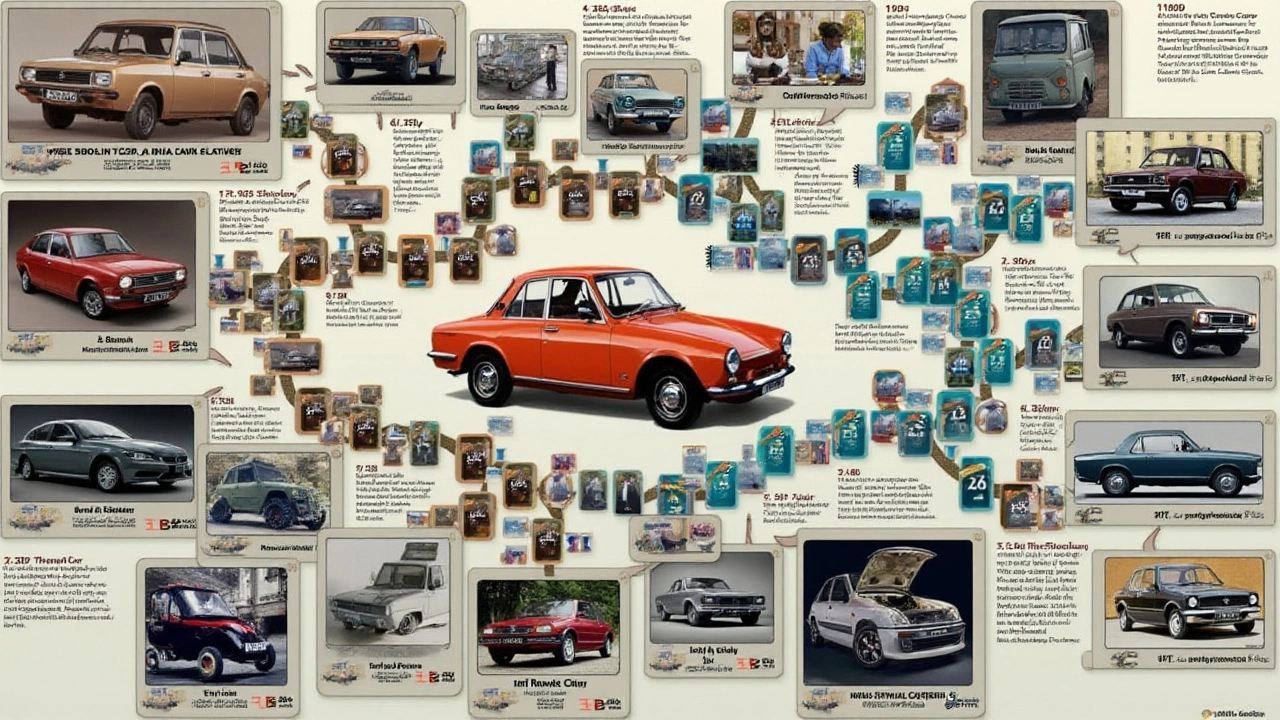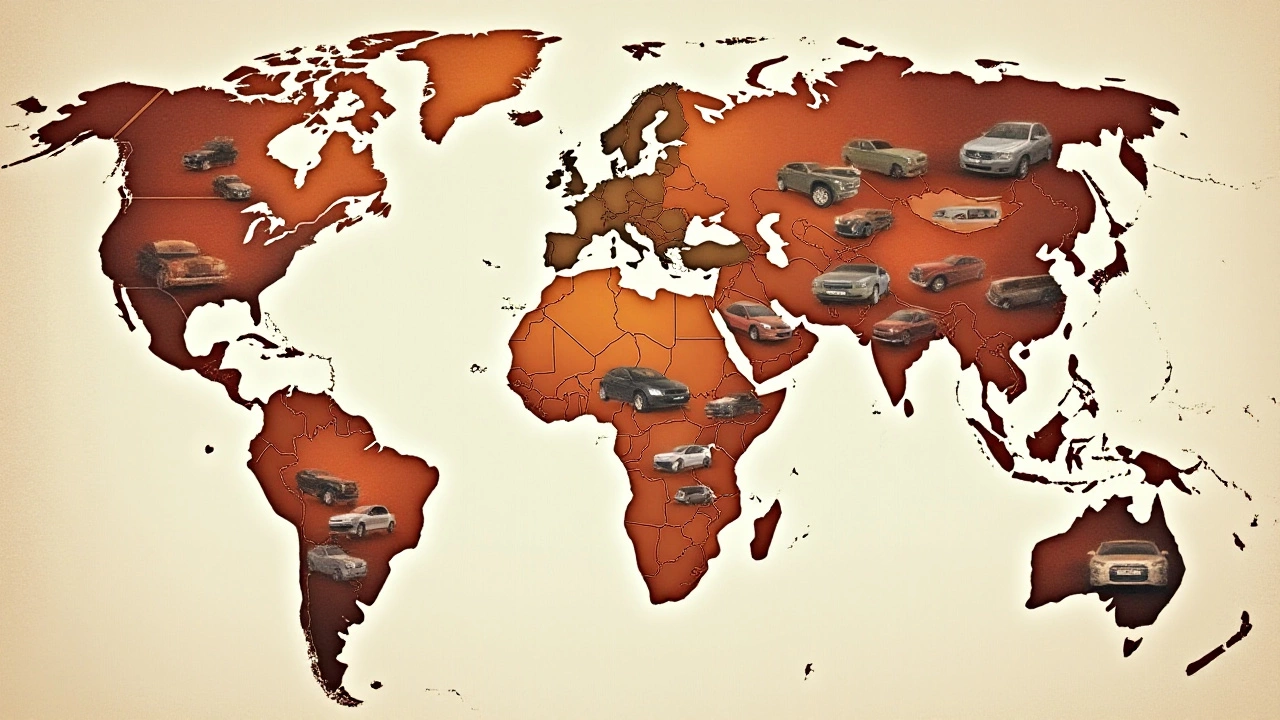The world of car manufacturing is a vibrant tapestry of innovation, tradition, and economic power. Cars are more than just machines; they are a reflection of human endeavor and technological progress. Across the globe, certain models have etched their names into the annals of history through sheer volume of production. Understanding which models have been manufactured the most allows us to appreciate the evolution of the industry, particularly highlighting the growing influence of countries like India on the global stage.
In recent decades, India has become a formidable player in the automotive arena, producing not only for local consumption but also for export worldwide. This emergence has reshaped global manufacturing trends, positioning the country as a vital hub for international carmakers. As we explore this topic, consider how technological innovations like automation and sustainable practices are further pushing the boundaries of what's possible in car production.
- Historical Leaders in Car Manufacturing
- India's Role in the Global Car Market
- Technological Advances in Manufacturing
- Economic Impact of Car Production
Historical Leaders in Car Manufacturing
The journey of car manufacturing is a story of visionaries and trailblazers who revolutionized how we travel. Among the giants, the automotive industry has witnessed several models reaching iconic status due to their sheer production numbers. One of the earliest leaders in mass production was the legendary Ford Model T. Introduced in 1908, it was the brainchild of Henry Ford, who famously stated, "Any customer can have a car painted any color that he wants, so long as it is black." The Model T set the standard for assembly line production, drastically reducing costs and making automobiles accessible to the masses.
Following the Model T's success, Volkswagen stepped into the spotlight with its Beetle, a car designed to be a people's car in the truest sense. Launched in 1938, the Beetle became an emblem of efficiency and reliability. Its enduring design continued into the 21st century, with manufacturing peaking post-war and contributing significantly to the automotive landscape. Interestingly, the Beetle held the title of the most manufactured car until it was surpassed by the Toyota Corolla. First rolled out in 1966, the Corolla quickly rose through the ranks, symbolizing durability and practicality, two key attributes that appealed to a global market.
Today, the Toyota Corolla stands as the most manufactured car, with sales exceeding 50 million units as of the latest statistics. Its ongoing success underscores a shift in consumer preference towards compact and economical vehicles, further fueled by the globalization of manufacturing. The ability of Toyota to adapt and evolve its models in response to changing demands has cemented its status as a manufacturing leader. Highlighting this evolution, the company continues to invest heavily in technology, enhancing efficiency and reducing environmental impact through hybrid versions.
Another noteworthy contender is the Honda Civic, admired for its engineering excellence and fuel economy. Since its inception in 1972, it has become a popular choice across various demographics. The Civic’s ongoing presence in markets worldwide illuminates its adaptability and the technical prowess Honda has maintained in the face of competitive challenges. The development strategies employed by Honda, focusing on incremental improvements and consumer-centric features, are often studied in business schools as models of innovation and customer loyalty.
Historically, car manufacturing giants have tackled distinct challenges to maintain their market positions. These have included economic downturns, evolving environmental regulations, and disruptive technological advancements. Notably, in today’s context, manufacturers are re-evaluating their strategies to incorporate electric and hybrid vehicles, ensuring they remain relevant amidst a preference for sustainable options. Advancements in this area are rapid, with leaders like Tesla showcasing how entirely new companies can challenge established norms and push the industry towards a greener future.
As we delve into this rich history, it becomes apparent that the legacy of these historical leaders is not merely in the numbers they boast but in their lasting impact on global culture and lifestyle. The cars they produced became symbols of freedom, progress, and technological triumph. This story of innovation continues, driven by consumer demands for efficient, reliable, and sustainable vehicles that cater to an ever-evolving world.

India's Role in the Global Car Market
India has blossomed into one of the most significant players in the automotive industry, a remarkable evolution driven by technological advancements and strategic economic planning. The country's automotive sector is a combined powerhouse of efficiency, innovation, and strategic foresight. Embracing both the demand of its burgeoning middle class and the expansive opportunities provided by export markets, India stands as a testament to what can be achieved when an industry is keen on perpetual growth and adaptation. The influence of major Indian manufacturers such as Tata Motors and Mahindra & Mahindra has transcended local borders, reaching global acclaim. The strategies these companies employ emphasize excellent production efficiency, competitive pricing, and sustainable practices, all significant factors in positioning India prominently on the automotive map.
Expansive production capabilities have supported India's dramatic rise in the automotive industry. The country holds its place as the world's fourth-largest car producer, a status fueled by the constant demand from not only domestic consumers but also international markets that appreciate the comprehensive nature of its production strategies. Special Economic Zones (SEZs) and Make in India initiatives have vastly encouraged foreign investment in the sector, nurturing a conducive environment for manufacturing that has seen substantial growth. The backbone of India's robust automotive industry is its extensive supply chain, with thousands of smaller component manufacturers seamlessly supporting larger companies in achieving their production goals.
Companies such as Suzuki, Kia, and Hyundai have established monumental manufacturing hubs on Indian soil, underscoring the country's vital role in their strategic growth. India has become a go-to location for compact car production—these smaller, efficient vehicles are particularly popular in European and South Asian markets, hence India’s importance to global supply chains. India's automotive sector not only serves national interests but increasingly acts as a crucial global player. With sustainability taking center stage in recent years, the transition to electric vehicles (EVs) has added another dimension to India's engagement with global manufacturing trends.
The Electronic Vehicle Revolution
India's involvement in the emerging EV market marks an essential shift towards a sustainable future. Policies and fiscal incentives are firmly in place to bolster this industrial advance, amplifying new opportunities for manufacturers. As India paves the path for widespread adoption of EVs, the nation's technological landscape has been transforming rapidly. Initiatives aimed at fostering EV adoption have spawned innovations in EV technology, setting new standards in the large-scale production of environmentally friendly vehicles. A table of these policies and incentives illustrates how various regions are contributing to the nation's electric aspirations:| Policy/Incentive | Region |
|---|---|
| Subsidized EV Charging Infrastructure | Maharashtra |
| Tax Exemptions on Electric Fleets | Delhi |

Technological Advances in Manufacturing
The automotive industry has undergone a seismic transformation over the past few decades, propelled by technological innovations that continue to redefine the way cars are produced. The push towards advanced manufacturing processes is not just confined to luxury brands; even mass-produced models have benefited significantly from these innovations. Industries all around the world, especially in countries like India, have integrated cutting-edge technology to not only enhance efficiency but also improve the quality and safety of vehicles produced. Of particular note is the adoption of automation in assembly lines, which has drastically reduced manual labor while increasing the consistency and precision of manufacturing. Robots now perform intricate tasks that were once impossible for humans, greatly minimizing error margins and production time.
Significantly, the emergence of smart manufacturing and the Internet of Things (IoT) has also revolutionized automotive manufacturing. Sensors embedded within machinery provide real-time data that can predict failures before they happen, thus preventing costly downtime. This capability is termed predictive maintenance, and it represents a leap forward in ensuring seamless production processes. In India, this has meant that cars can be manufactured at scales previously thought unachievable, all the while maintaining high standards of quality. Smart sensors and connected machinery allow manufacturers to fine-tune their production lines with unprecedented accuracy, paving the way for more sustainable practices by optimizing resource use and minimizing waste.
Another advancement reshaping the industry is the utilization of 3D printing technology. Originally employed for prototyping, 3D printing is now used to produce complex parts that integrate seamlessly with traditional manufacturing processes. The ability to quickly iterate designs and rapidly create customized components has opened new doors in the automotive market, making it more responsive to consumer needs. India is witnessing a surge in companies adopting this technology to cut costs and reduce lead times, enabling smaller startups to compete with established car manufacturers.
Advanced materials are also playing a crucial role. Lightweight yet strong materials such as carbon fiber and advanced steel alloys are often used to improve fuel efficiency without compromising safety. This is crucial for meeting stringent emissions regulations, something that is becoming increasingly important as environmental awareness grows. India, with its burgeoning middle class and growing demand for vehicles, finds itself at the heart of this shift, becoming a testbed for new materials that balance cost, performance, and environmental impact.
"The key to successful automotive manufacturing today lies in intelligent automation and smart production facilities," states Anant Maheshwari, President of a major technology firm, emphasizing the critical role these technologies play.
Finally, the role of artificial intelligence and machine learning cannot be overstated. These technologies analyze enormous datasets to provide insights that were previously unattainable. In the context of manufacturing, AI helps optimize production lines, reducing waste and ensuring that each component meets rigorous quality standards. By doing so, manufacturers in India and around the globe can create reliable vehicles that satisfy consumer expectations without exorbitant costs. The role of such technological advances is integral to understanding the ever-evolving landscape of car production, especially in rapidly developing economies.

Economic Impact of Car Production
The automotive industry, particularly car production, plays a crucial role in shaping global economies. This dynamic sector is a catalyst for development, influencing everything from employment rates to infrastructure advancements. For instance, the industry employs millions of people worldwide, not just on assembly lines, but also in areas like part supply, logistics, research, and dealership networks. Each vehicle rolling out of a factory signifies a joint effort of myriad sectors working in unison, creating a ripple effect on job creation and local economies.
In India, the impact of increased car production is markedly significant. With a burgeoning middle class and growing aspirations, India has seen a rapid increase in demand and production of vehicles. Major international car manufacturers, such as Suzuki and Hyundai, leverage India's cost-effective labor and extensive supply chains to produce vehicles not only for domestic markets but also for export around the globe. This has entrenched India as a vital cog in the global automotive supply chain, elevating its economic clout.
The Supply Chain Ripple Effect
The auto industry is interconnected, influencing various sectors like steel, rubber, glass, and electronics. Each car comprises thousands of components sourced and manufactured globally, which creates a vast web of interdependencies. When production increases, it stimulates these supporting industries, leading to increased industrial activity and economic growth. An increase in car production often boosts demand for raw materials and ancillary services, leading to improved economic conditions in those sectors, as evidenced by the booming steel and rubber industries.
Moreover, the focus on electric vehicles is redefining these supply chains. Companies are investing in sustainable practices, transforming traditional production methods. A report from McKinsey noted, "The shift towards electric vehicles not only changes the nature of vehicle manufacturing but significantly alters the economic landscape in terms of energy consumption." As this transition gathers pace, it heralds new opportunities for economies that embrace and innovate in the renewable energy sector.
Consumer Influence and Economic Growth
The increase in car ownership is directly linked to economic prosperity. As people have more purchasing power, car sales tend to rise, stimulating the economy. In countries like India, where public transport infrastructure is still developing in many areas, personal vehicles remain a primary mode for commuting, underscoring the importance of car production in societal advancement. Additionally, consumer preferences shape manufacturing trends, with new technologies and safety features becoming standard due to market demand.
"The health of a nation's economy is oftentimes reflected in the automotive sector," observed a spokesperson from the World Economic Forum. "Vehicle sales are both an indicator and a driver of economic vitality, influencing GDP growth and employment rates." This synergy between the economy and the automotive sector highlights the far-reaching impact of car manufacturing beyond mere transportation solutions.
The Role of Policy and Regulation
Government policies significantly influence car production's economic impact. By creating favorable investment conditions, such as tax incentives or subsidies for electric vehicles, authorities can spur industrial growth and technological innovation. Compliance with environmental standards has also prompted manufacturers to invest in cleaner technologies, boosting sectors like renewable energy and recycling industries. The Indian government’s push for a complete transition to electric vehicles by 2030 is a vivid example of how policy can drive massive industrial shifts and open new economic frontiers.
In summary, the economic impact of car production extends well beyond the factories, embedding itself into the fabric of global economies. It links to employment, supply chains, consumer trends, and governmental strategies, making it a cornerstone of modern economic structures. Countries that effectively integrate the automotive industry into their economic strategies often find themselves on a pathway to sustained growth and innovation.

